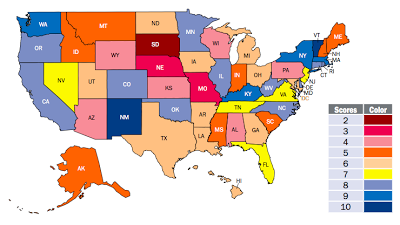Kentucky ranks high in prescription drug abuse, but also is a national leader in efforts to fight it, state-by-state analysis says

Kentucky Health News
A new report finds many states do not have effective strategies in place to fight prescription drug abuse, but Kentucky scores high on most prevention measures, indicating that the state is working hard to combat the problem.
The Trust for America’s Health report found that Kentucky, along with Massachusetts, New York and Washington, scored 9 out of 10 possible indicators of promising strategies to fight prescription drug abuse. Only two states, New Mexico and Vermont, scored 10 out of 10, while 28 states and Washington, D.C., scored 6 or less.
Prescription drug abuse has become a top national and state public health concern. Since 1999, rates have doubled in 29 states, tripled in 10 and quadrupled in four, including Kentucky. The state has the third highest drug-overdose death rate in the country, with 236 people per million people suffering overdose fatalities in 2010.
“Prescription drugs can be a miracle for many, but misuse can have dire consequences. The rapid rise of abuse requires nothing short of a full-scale response – starting with prevention and education all the way through to expanding and modernizing treatment,” said Dr. Jeffrey Levi, executive director of Trust for America’s Health, in a news release. “There are many promising signs that we can turn this around – but it requires urgent action.”
To develop scores for the report, the organization worked with public-health, clinical, injury-prevention, law-enforcement and community organization experts to review a range of national recommendations and examine the 10 indicators. Kentucky received 9 out of 10 points because it:
- Has an active prescription drug monitoring program
- Requires utilization of monitoring program by prescribers
- Is participating in Medicaid expansion, which helps expand coverage of substance abuse services and treatment
- Has a “doctor shopping” law specifying that patients are prohibited from withholding information about prior prescriptions from their healthcare provider
- Requires or recommends prescriber education
- Has a rescue drug law to expand access to and use of naloxone, a prescription drug that can help counteract an overdose
- Has a law requiring health care providers to physically examine patients (or have a bona-fide physician-patient relationship) before prescribing a controlled substance
- Has a law requiring or permitting a pharmacist to require an ID prior to dispensing a controlled substance
- Has a pharmacy lock-in program under the state’s Medicaid plan where individuals suspected of misusing controlled substances must use a single prescriber and pharmacy.
“We must use the best lessons we know from other public health and injury prevention success stories to work in partnership with clinical care, law enforcement, the business community, community-based organizations, and other partners to work together to curb this crisis,” said Andrea Gielen, director of the Johns Hopkins Center for Injury Research and Policy, in a news release. Click here for a full description of the indicators, state scores and the full report.
